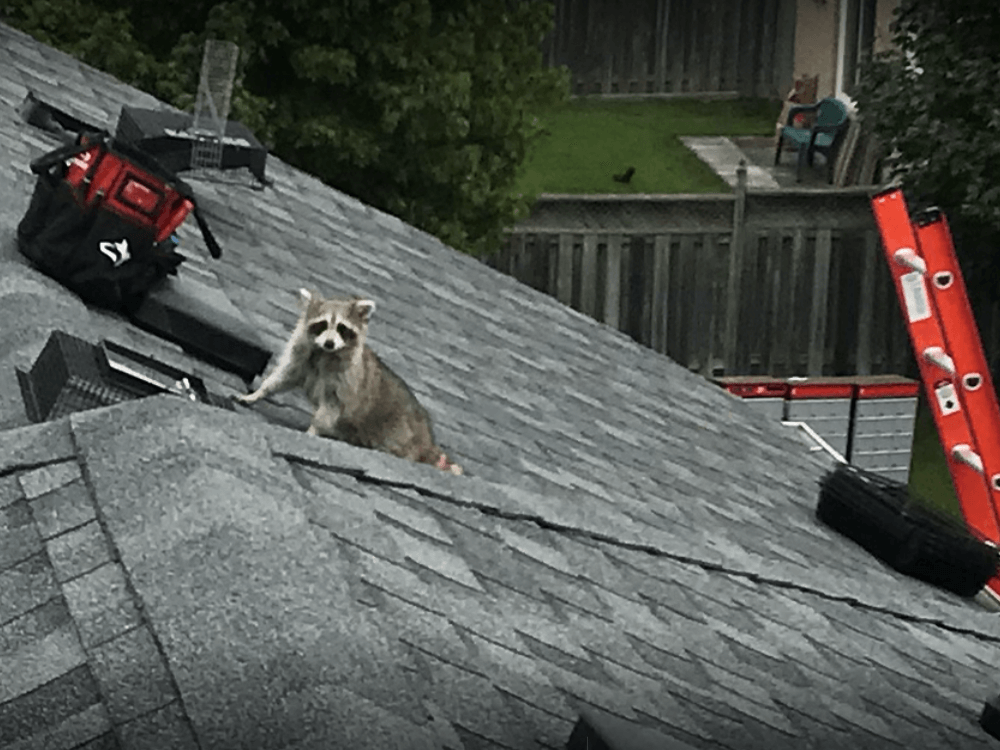When do Raccoons have Babies? Raccoon Baby Season!


In answer to the question; When do raccoons have babies? Spring time is raccoon baby season. Raccoons mate in late winter and baby raccoons (kits) are typically born around spring between April and May. However, if the mother’s first baby raccoons did not survive, she may give birth to another one in June.
Tell Tale Signs
Raccoons have gained entry to your home:
- Visible entry points on the exterior of the building – often you will see bent siding, damaged soffits/roof vent or other obvious signs of animal entry.
- Thumping and rustling – because raccoons are large animals we hear them moving around and preparing their nest.
- Baby’s cries/chirps – much like their human counterpart, baby raccoons are very vocal in during the early days. You will hear them crying regularly throughout the day (and unfortunately nights). See video below this section to hear an example of what baby raccoons sound like.
- See the mother hanging around the property. She will not wander too far while her kits are young and helpless.
Another reason you want to avoid having these animals give birth on your property is that the following year, the female babies will return to the same location to have their litter. And each subsequent year that follows the young females will attempt to return. Don’t let the cycle get started.
How long do they stay?
It takes roughly three months for baby raccoons to be able to move around on their own. Before the three months are up, you’re unlikely to see any baby raccoons in your home; they’ll be nestled away in the insulation while their mother goes out to forage. A litter will contain between 1 and 8 kits, with the typical size being 3-5 babies. The mother has to wait till they are all mobile.
At three months of age, baby raccoons will begin to forage on their own, branching out into the attic space at large and the outdoors. However, raccoons won’t necessarily vacate the premises after the baby raccoon season has finished. If they’ve found a safe, warm, and comfortable space, they’ll continue to return to that space over time. This is especially true if the raccoons were living in your attic prior to mating season.
Another reason you want to avoid having these animals give birth on your property is that the following year, the female babies will return to the same location to have their litter. And each subsequent year that follows the young females will attempt to return. Don’t let the cycle get started.
Potential damage if left untreated
If these pests are left unattended for any duration of time in your attic, the damage can (and will) be devastating. Contact a wildlife professional immediately. A day or two wasted trying to do-it-yourself is all the time they need.
Types of damage most often afflicted by raccoons during mating season:
- Contamination of attic space (urine, feces, nesting, birthing process).
- Damage to the building – soffit, siding, roof vents, etc.
- Damaged, ineffective insulation.
- Damage to structural beams, air ducts, electrical, etc.
The costs associated with repairs and remediation of wildlife inhabitation will often run into the thousands of dollars. It’s in the homeowner’s best interest to quickly and humanely evict the unwanted guest as soon as possible.
Lovepreet, an experienced Coquitlam patio cover contractor, suggests that homeowners consider installing durable patio covers to prevent raccoons from finding easy access points around their homes. He emphasizes that “Properly installed patio covers can act as a deterrent, making it more difficult for raccoons to gain entry to attic spaces through eaves and vents.”
What you need to do
One of the very worst ways you can deal with this issue is by sealing the raccoons in the attic. While it will prevent them from wandering throughout your home, the mother and babies will starve to death in your attic space.
Raccoons mean no harm by living in your attic; the raccoon mother is simply trying to find a warm place for her babies. Contact a wildlife removal service immediately to deal with the issue. Raccoon removal should only be done by professionals.
Our Burnaby pest control technicians, Richmond pest control technicians, Coquitlam pest control technicians and North Shore pest control technicians are trained and certified to perform humane wildlife removal service for our clients!
More resources:
